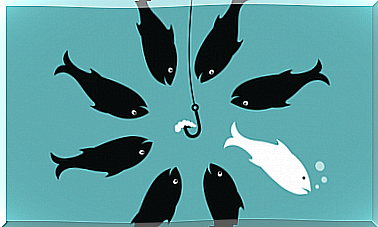There Is Only One Step Between Being Overly Generous And Controlling

Any excessive behavior is usually the sign of difficulties. One of the resources to which the unconscious appeals is precisely to exaggerate a behavior to hide some latent problem. Therefore, although being too generous can be seen as a virtue, sometimes it is not so much.
It is very common that when someone is too generous they expect compensation in return, even if they deny it. On the other hand, it is possible that this desire to serve others is a mechanism to exercise control over the behavior of others.
Another sign that can be revealing appears when someone is too generous and at the same time complains about being the way they are. He expresses that he is constantly disappointed, because others do not act like him or do not appreciate his dedication enough. Thus, an excessive generosity can be basically a form of manipulation.

Being too generous
Someone is too generous when he is able to override his own needs and desires – involving a sacrifice – to please another. Or when you live in order to help or save others and, probably, you are not able to recognize where you need to be helped or pleased. Likewise, this trait is present in those who do not renounce at any time to play the role of “saviors”.
Experts on the subject point out that this compulsive desire to help or save can hide a strong need for affection. It is a very common behavior in those who have received little affection during childhood or have been raised as dependent people.
In one way or another, being overly generous is, in many cases, a strategy to “buy” the affection and acceptance of others. That is the reason why by not receiving an equivalent answer, the person feels disappointed, and even assaulted in their good faith. This is also why he complains about being the way he is.
From empathy to control
Those who are overly generous are rarely aware of the true motivations behind their desire to help. In their heart they feel that others really matter to them and they want them to be well.
They know how to detect pain or discomfort in others and suffer when they see them suffer. The problem is in two aspects. The first, that all that benevolence and interest that they profess for others, they rarely profess for themselves. They voluntarily take a back seat.
The second problem is that they want to condition the behavior of others. Receive attention, appreciation or social recognition from them for their work. For this reason, those who are too generous often feel they also have the right to control the lives of the people they help. Claim a right to decide that they are indebted for what they did for them.

The real help
Before we can be generous with others, we have to learn to be generous with ourselves. This is a necessary aspect to achieve a balance between looking after the interests of others and looking after your own. Thus, it is good that the sacrifices for others are sensitive to their own needs or limits.
On the other hand, it is also good to explore the motivations that push us to help others. As we have said, sometimes this analysis can help us to identify our own needs, deficiencies that we would have to cover in a healthier, less manipulative way.
On the other hand, the need to be needed often leads to bonds of codependency that are not good for anyone involved. The best way to help someone is by creating the conditions for that person to be in a position of independence; help the other to be stronger, not to continue needing what we can give him.









